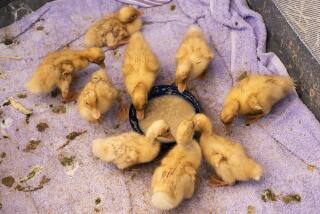GARDEN GROVE : Abundance of Ducks Befowls Pond Near Library
- Share via
The pond behind the city’s main library on Stanford Avenue was designed as a focal point that would mirror the architecture of the adjacent Civic Center.
But the shallow lagoon over the years has attracted so many ducks and geese that it has become more cesspool than reflecting pool.
Over the weekend, the problem became acute after several days of high temperatures, which caused the pond to emit a foul odor. “It’s like having your toilet back up on you,” one passerby said Monday. “It smells bad .”
The stench was so strong that patrons of the library and nearby government buildings complained.
City officials say the problem is that the ducks and geese excrete far more waste than the pond can accommodate.
“Five ducks are the equivalent of one human in terms of excrement,” said Greg Brown, the city’s facilities manager. “We’ve counted over 150 ducks out there.”
The library’s staff says the problem has developed over the years, gradually turning the pond from clear to mossy green, with a consistency of pea soup and a vile-looking surface foam. The pollution is so bad, they say, that white ducks that venture into the water emerge green.
To clean up the mess, the city plans to drain the pond in October, remove its plastic liner and pour a concrete bed, and improve the circulation and aeration systems at a cost of $110,000.
But Brown said that won’t solve the problem permanently.
“No filtration system can handle the number of ducks we have,” Brown said. “We have been told a pond of this size can handle six or eight ducks.”
Getting rid of the waterfowl is not an option, officials say, because they are wildlife and thus protected under state law. Besides, they have a following among library patrons and duck lovers, who say that the city should have done more, sooner.
City workers “haven’t been out here in three years,” said Nanda Tuttle, 49, who visits the ducks at least twice a day. “Just because the ducks don’t pay taxes doesn’t mean they shouldn’t do anything,” she said of city officials.
Many on the library staff have grown so fond of the ducks that they have named those with the more distinct personalities, and they say that the pond is part of the ambience for many their patrons.
“Children come to the library to get their books, and then they take bread to the pond to feed the ducks,” librarian Laura Masoner said.
On the other hand, the library, being in the building nearest the pond, gets the worst of the odor and also the brunt of the public’s complaints.
“People think it’s our pond. They want us to do something,” said Deanna Irwin, a library assistant. “We claim the ducks, but not the pond.”
More to Read
Sign up for Essential California
The most important California stories and recommendations in your inbox every morning.
You may occasionally receive promotional content from the Los Angeles Times.













